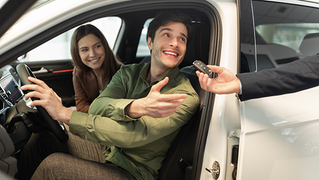
Guide To Donating Your Car
You don’t have to write a check to help.
Donating goods, such as cars, can be a bit trickier than the usual monetary donation. The biggest winner in the car donation process is usually the donor and not the charity recipient. But if you take your time, ignore the quick and easy television appeals, and find a reputable, high-performing charity that will make the most of your donation, then you can maximize the amount that actually gets to charity and minimizes your risk of an IRS audit.
Find a Charity that Directly Accepts Car Donations
If at all possible, avoid the for-profit intermediary organizations that advertise so pervasively to handle your car donations. By finding a charity that handles the transaction themselves, you can ensure that 100% of the profits remain at the charity. It's possible that the charities you already support have a car-donation program that you don't know about. Check with them first. If not, do a little research, and find a high-performing charity that does the kind of work you like, in the region you wish to target, and does that work well.
Make Sure Your Intended Organization is a
501(c)(3)
Get the most out of your donation by knowing the tax benefits of giving. Make sure your intended recipient has 501(c)(3) public charity status. While many organizations can claim non-profit status, donations to 501(c)(4) organizations are generally not tax-deductible. These are political organizations with permission to lobby our government.
Transfer the Car Correctly to the Charity
Some charities will ask you to leave the assignment of ownership space on the charity donation papers blank, so they don't have to re-title the auto. If your charity asks this of you, find another charity. If you don't formally sign your car over to the designated nonprofit, you will be held responsible for any parking tickets that are subsequently incurred, or liable if it's used in a crime. Remember, the charity you give the car to will probably not use your car to deliver meals to the needy, but will simply sell it as quickly as possible. When someone buys it from them at auction and doesn't bother to register that car, it's still yours in the eyes of the law.
Use Fair Market Value (FMV) for the Car
There are several exceptions which allow you to use the Kelley Blue Book or a NADA guide, but you must use the FMV, not simply the highest value listed for the year and make of your car. Use the FMV when:
- instead of selling the vehicle, the charity keeps and uses it,
- the charity makes improvements to the car before selling it,
- your car is sold at a discounted price to a person with a low income,
- or if the car is worth less than $500.
Otherwise, you can only deduct the amount that the charity sells the car for at auction as indicated on the written receipt the charity sends you.
Complete Your Paperwork
Non-cash donations are the most common triggers of IRS audits, so it is important to keep thorough documentation of a car donation. Specifically, if your car is valued over $250, then you need to obtain and retain a written acknowledgment from the charity. Additionally, if your car is worth more than $500, you must complete section A of the IRS Form 8283 and attach it to your yearly taxes. Furthermore, if your car is worth over $5,000, then you must have an independent appraisal and fill out Section B of IRS Form 8283.
For more information, please see IRS Publication 4303, A Donor's Guide to Vehicle Donations.


